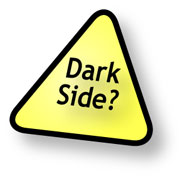Concerns Over Curcumin Compounds in Turmeric

The vast majority of scientific studies indicate that curcumin, the main bioactive component in turmeric, is safe. Many indicate it can help prevent and treat cancer. (i.59)
However, a small group of researchers has raised concerns that there may be a "dark side" to curcumin. The group even suggests curcumin could have effects that promote cancer. (66)
Further, these researchers argue that considering curcumin safe and efficient is "unfortunate" since, in their view, this hasn't been proven. Their opinion contradicts most other scientific literature and conclusions reached by U.S. and European food safety authorities. Nonetheless, it warrants a more in-depth look since their paper is often cited. (i.59, 66)
Evidence of Curcumin's Dark Side
What makes these researchers worried about curcumin? Their opinions appear to be based in large part on three lines of reasoning:

- NTP Report on Turmeric: The U.S. Department of Health and Human Services National Toxicology Program (NTP) conducted animal studies on turmeric oleoresin containing high levels of curcumin and published their findings in 1993. The turmeric extracts were added to the diets of mice and rats. Dosages ranged between 80 and 8,400 mg/kg of body weight daily for two years. (i.23, 64)
- Curcumin Can Generate Free Radicals: Several lab and animal studies show that high concentrations of curcumin can produce free radicals instead of acting as an antioxidant. The researchers at the University of Seville, Department of Pharmacology contend that these results should raise more concern about curcumin's safety. (i.66)
- Lack of Sufficient Proof that Curcumin is Effective: In 2008, one of these researchers argued that Phase I, II, and III clinical trials in cancer patients would be necessary to prove curcumin is an effective and nontoxic cancer treatment. In 2010, the entire group further stated that the "effectiveness of a drug is usually established by randomized, placebo-controlled, double-blind clinical trials, and no such trials have shown curcumin to be effective so far." Based on these two assertions, they concluded there is not enough proof that curcumin is effective against cancer. (i.23, 66)
In the NTP report, there were some unclear findings of toxic and carcinogenic effects. This led one of the "dark side" researchers to say that high-dosage supplements of curcumin could cause cancer in people if taken for a long time. (i.23, 64)
This is because free radicals can cause DNA damage, modify natural antioxidant production in the body, and inactivate tumor suppressors. Free radical damage can also make harmful changes to mitochondria in cells. Mitochondria are the organelles that produce energy for cells to function. All of this free radical activity could potentially contribute to the development or progression of cancer. (i.66)
Evidence Disputing Curcumin's Dark Side
These worries are contradicted or countered by the following: (i.23, 50, 59, 64, 66, 68-74)
Food Safety Authorities Declare Curcumin is Non-Carcinogenic
The 1993 NTP report produced mostly positive results. In it, the U.S. scientists tested the safety of turmeric oleoresin, which contained 79-85% curcumin. This report was part of the evidence reviewed by European authorities when they were determining curcumin's safety. In fact, the European experts cited the results from the NTP report in support of their conclusion that curcumin is safe and not a carcinogen.
Their food safety scientists did make note of the few equivocal findings of cancer-causing activity mentioned in the NTP report. However, when these scientists reviewed the results, they determined the tumors found were actually benign, not malignant. There was no mention of this fact by the research team worried about curcumin.
Scientists Refute Curcumin Causes DNA Damage with New Research
The concern raised that turmeric's curcumin compound can damage DNA was based on results of certain lab studies. DNA damage can lead to the development of cancer. However, other scientists considered these lab results insufficient to reach the conclusion that the Seville group did.
Results from reportedly better-documented studies also contradict the findings that curcumin directly damages DNA. The results of these more rigorous studies, according to some scientists, suggest it would have been impossible for curcumin to cause the damage found in the earlier lab studies.
In addition, a clinical study involving patients with oral submucous fibrosis showed curcumin-containing turmeric actually reversed DNA damage. Oral submucous fibrosis is a precancerous condition in the mouth.
Curcumin Generates Free Radicals to Kill Unhealthy Cells
To date, the pro-oxidant effects of curcumin are found mostly in studies that demonstrated that curcumin generates free radicals to kill cancer cells with free radicals — not to kill normal, healthy cells. There have been lab experiments where high doses of curcumin caused normal cells to die. However, animal studies with the same high doses of curcumin demonstrated the opposite on the same types of tissue (e.g., liver cells).
How do scientists explain these apparently conflicting results? Those who conducted the lab and animal studies offered one explanation. In the body, curcumin stimulates the production of natural antioxidants that protect normal cells. In fact, even those concerned about curcumin's safety acknowledge it stimulates production of antioxidants and promotes antioxidant activity.
Missing Clinical Trial Evidence of Curcumin's Chemotherapeutic Effect
In 2008, one of those concerned about curcumin raised the fact that curcumin has poor bioavailability. This generally means the substance is poorly absorbed into the bloodstream, and that it doesn't stay in the body long enough to be effective.
Is Curcumin Ineffective and Safe? Or is Curcumin Effective but Unsafe?
The researcher stated that this made curcumin both ineffective as a cancer treatment and non-toxic. He predicted that because curcumin is so quickly broken down in the digestive system, it would not even work against cancer there. However, he did acknowledge evidence that showed curcumin's chemopreventive effects go beyond the gastrointestinal tract. But he does not explain how curcumin demonstrates effects that can prevent cancer without bioavailability. He also doesn't explain his apparently contradictory statements on curcumin's safety. How can curcumin be both non-toxic and potentially cause cancer?
In 2010, he and others concede that curcumin has benefits that could be developed into a pharmaceutical drug. However, they expected pure curcumin to fail to demonstrate any benefit in a Phase II pancreatic cancer clinical study. Their expectation of failure was because of curcumin's poor bioavailability.
Inaccurate Statements about Drug Treatment Standards
The “dark side” researchers concluded their 2010 article by commenting on the usual standard for determining a drug's effectiveness. They state that the accepted standard to measure effectiveness is a randomized, double blind, placebo-controlled clinical trial, and that no one had conducted any for curcumin. But they fail to mention that this type of clinical trial is actually not the standard for chemotherapy drugs — a fact noted by one of same researchers in 2008. Chemotherapy effectiveness is typically measured against that of other chemotherapy drugs, not against a placebo.
Failure to Disclose Study Results that Contradict their Conclusions
What is conspicuously not mentioned in the 2010 article is evidence that curcumin did show effectiveness as a cancer treatment for pancreatic cancer. The evidence came from results of a Phase II clinical trial published in 2008. Conducted at the University of Texas M.D. Anderson Cancer Center, the clinical trial involved patients in advanced stages of the lethal cancer. Two of the 21 patients available for evaluation showed clinical responses to curcumin. One patient had stabilized disease for about 2.5 years, and another had a brief but dramatic 73% reduction in pancreatic tumor size.
The two treatment drugs approved by the U.S. Food and Drug Administration to treat pancreatic cancer produce responses in less than 10% of patients. Given this, curcumin does appear to have value as an effective chemotherapy drug for this type of cancer. Not only was it safe and effective, the stage 4 pancreatic cancer patients tolerated curcumin well. They had none of the severe side effects often associated with chemotherapy drugs.
Join the 1000s of People Who Are Discovering the Benefits of Turmeric.

Healthceuticals® Turmeric Curcumin Complex
100% Certified
Organic ingredients
- Organic Turmeric Extract - standardized to 95% curcuminoids.
- Organic Whole Turmeric - provides full spectrum antioxidant, anti-inflammatory turmeric benefits, including turmerones and numerous vitamins, minerals, and phytonutrients
- Organic Black Pepper Extract - standardized to 95% piperine; dramatically enhances bioavailablity.
- Organic Phospholipids - markedly improve absorption.
- Organic Ginger - works synergistically with turmeric to provide more powerful benefits.
- Absolutely FREE of potentially harmful additives and fillers such as magnesium stearate.




